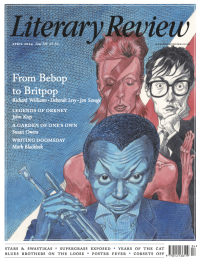Stephen Bates
Jailed for Being Disabled
The Undesirables: The Law that Locked Away a Generation
By Sarah Wise
Oneworld 352pp £22
In 1910, when two ladies from the Eugenics Education Society lobbied the home secretary for the incarceration of the feeble-minded to prevent them from breeding, they found a sympathetic hearing. The minister in question, Winston Churchill (then in his Liberal phase), told them that as many as 130,000 such people were at large. ‘If, by any arrangement … we are able to segregate these people under proper conditions, that their curse dies with them and is not transmitted to future generations … we shall have taken upon our shoulders in our own lifetime a work for which those who come after us will owe us a debt of gratitude,’ he said.
That work produced the 1913 Mental Deficiency Act, which categorised society’s undesirables along supposedly scientific lines as idiots, the feeble-minded (those incapable of competing on equal terms or ‘managing themselves … with ordinary prudence’), imbeciles (people ‘capable of guarding themselves against common physical dangers’ but incapable of earning a living) and ‘moral imbeciles’ (those displaying some ‘mental defect coupled with strange, vicious or criminal propensities’). It was a triumph of sorts for eugenicists like H G Wells, who said, ‘we want fewer and better children … we cannot make the social life and world peace that we are determined to make, with the ill-bred, ill-trained swarms of inferior citizens that you inflict upon us.’
It is estimated that by 1950 fifty thousand people classed as feeble-minded were in institutions. It is their often heartbreaking experiences that the historian Sarah Wise diligently records in The Undesirables. Having previously written about lunacy in Victorian England, she has now turned to a largely forgotten 20th-century scandal. Many

Sign Up to our newsletter
Receive free articles, highlights from the archive, news, details of prizes, and much more.@Lit_Review
Follow Literary Review on Twitter
Twitter Feed
The era of dollar dominance might be coming to an end. But if not the dollar, which currency will be the backbone of the global economic system?
@HowardJDavies weighs up the alternatives.
Howard Davies - Greenbacks Down, First Editions Up
Howard Davies: Greenbacks Down, First Editions Up - Our Dollar, Your Problem: An Insider’s View of Seven Turbulent...
literaryreview.co.uk
Johannes Gutenberg cut corners at every turn when putting together his bible. How, then, did his creation achieve such renown?
@JosephHone_ investigates.
Joseph Hone - Start the Presses!
Joseph Hone: Start the Presses! - Johannes Gutenberg: A Biography in Books by Eric Marshall White
literaryreview.co.uk
Convinced of her own brilliance, Gertrude Stein wished to be ‘as popular as Gilbert and Sullivan’ and laboured tirelessly to ensure that her celebrity would outlive her.
@sophieolive examines the real Stein.
Sophie Oliver - The Once & Future Genius
Sophie Oliver: The Once & Future Genius - Gertrude Stein: An Afterlife by Francesca Wade
literaryreview.co.uk